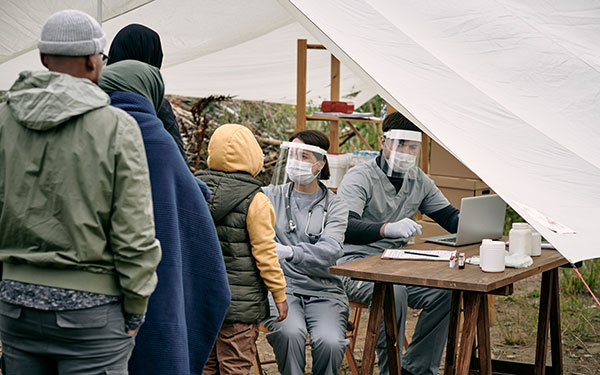Universal health coverage (UHC) is defined by the WHO as all people having “access to the full range of quality health services they need, when and where they need them, without financial hardship”. This full range of healthcare services should include not only treatment, rehabilitation and palliative care, but also support to live healthily and help prevent disease. In 2019, world leaders backed the first-ever political declaration on “Universal health coverage: moving together to build a healthier world”, pledging to ensure that all people have access to essential and quality health services that are safe, effective and affordable, without experiencing financial hardship and discrimination, by 2030.
However, only half of the world’s population has access to essential health services. And each year 70 million people experience poverty as a direct result of needing to pay for health services themselves, as costs are neither covered nor reimbursed by a government health system or health insurance scheme. As we prepare to reconvene discussions on UHC at the UN High-Level Meeting on 21 September, how close are we to this achieving this goal?
Investing in health: our moment for humility or hubris?
Health systems globally continue to grapple with the impact of the COVID-19 pandemic. The pandemic caused severe disruption in health systems and the provision of essential health services, including cancer care. And while governments rose to the challenge by sharply increasing health spending in 2020, counterintuitively, as the health of people and systems are still recovering, health spending appears to be a decreasing priority for many governments.
In 2022, government health spending declined, and in nearly half of the world’s countries the proportion of general government spending on health fell below 2019 levels. Levels of health spending have been particularly volatile in low- and middle-income countries in the past 2 decades. This global trend of underfunding health systems is a step backwards in the progress towards establishing UHC.
UHC supports and protects people, societies and economies, making all 3 more resilient in both calm and crisis. We are now in what physician and public health expert Sandro Galea has identified as public health’s modern “post-war moment”: are we really going to delay action – or even ignore – this opportunity to establish a stronger foundation for a better future and health for all?
Primary healthcare: building back and investing better

Increased investment in primary healthcare is particularly critical: it is the most inclusive, equitable and cost-effective healthcare approach, and where 90% of essential interventions for UHC can be delivered. This is also essential for improving cancer prevention, screening, diagnosis and care, and especially for addressing the global backlog in all 3 areas caused by the pandemic.
In late 2021, a Global Pulse Survey indicated that cancer services were disrupted across the globe, and by more than 50% in 44% of countries. The WHO warned that knock-on effects from these backlogs are projected to be felt for years; in the UK alone, waiting times for cancer treatments are at their worst recorded level.
UHC, NCDs and the ‘Big C’
Strengthening health systems, particularly in primary care, could address the global burden of non-communicable diseases (NCDs) and achieve the health-related sustainable development goals (SDGs):
- 3.4 – reducing premature deaths from NCDs through prevention and treatment
- 3.8 – UHC access to essential healthcare services, essential medicine and vaccines with financial risk protection
NCDs, including cancer, account for 41 million deaths per year, or 74% of deaths globally. More than three-quarters of these deaths (and 86% of the 17 million people who have died before the age of 70) occur in low- and middle-income countries. Funding for tackling NCDs in these countries has stagnated at 1–2% for two decades, despite the incidence of NCDs being disproportionately higher.
Policies to establish UHC and strengthen primary healthcare backed by appropriate levels of funding would play a key role in preventing and managing cancer and other NCDs globally. World Cancer Research Fund International is calling for the Political Declaration on UHC to recognise this global burden. This includes national UHC benefit packages that recognise the importance of the cancer continuum of care – from health promotion and prevention, to treatment, rehabilitation and palliative care – and to integrate aspects of cancer and NCD prevention into all levels of healthcare delivery.
This should include prevention services that address key risk factors for developing cancer, including the introduction or strengthening of policies that enable and support healthy diets and promote physical activity, as well as tobacco and alcohol control measures. Collectively, these actions would also work to address, prevent and treat both under- and over-nutrition, and the prevention and management of overweight and obesity (especially as obesity is becoming an increasingly prevalent risk factor for developing many types of cancer). Establishing UHC means improving conditions to prevent, treat and manage cancer and other NCDs globally; improving equity, access, and resilience of persons, populations, and global health security overall.
UHC: the time is now
As we now appear to exist in a state of “perma-crisis”, simultaneously facing the climate emergency, wars, famine, and cost-of-living crises, we need to accept a truth that we keep facing: we can’t wait any longer. Progress towards UHC and sustainably increasing investment in health will help to shockproof our people, nations and economies from future disasters – which is practically guaranteed to happen in one form or another. Strong health systems create resilient nations and economies. We are appealing to global leaders to commit to and be accountable for establishing and investing in UHC now.
> Read our position statement on universal health coverage
[content_block id=4981]
